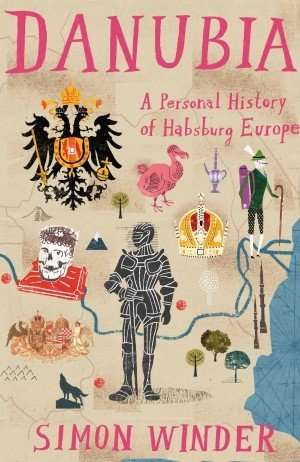DANUBIA by Simon Winder, Review: Brilliantly enthusiastic & funny
Simon Winder’s Danubia was longlisted for the Samuel Johnson Prize.
Danubia, A Personal History of Habsburg Europe Synopsis:
 For centuries much of Europe was in the hands of the very peculiar Habsburg family. An unstable mixture of wizards, obsessives, melancholics, bores, musicians and warriors, they saw off – through luck, guile and sheer mulishness – any number of rivals, until finally packing up in 1918. From their principal lairs along the Danube they ruled most of Central Europe and Germany and interfered everywhere – indeed the history of Europe hardly makes sense without them.
For centuries much of Europe was in the hands of the very peculiar Habsburg family. An unstable mixture of wizards, obsessives, melancholics, bores, musicians and warriors, they saw off – through luck, guile and sheer mulishness – any number of rivals, until finally packing up in 1918. From their principal lairs along the Danube they ruled most of Central Europe and Germany and interfered everywhere – indeed the history of Europe hardly makes sense without them.
Simon Winder’s extremely funny new book plunges the reader into a maelstrom of alchemy, skeletons, jewels, bear-moats, unfortunate marriages and a guinea-pig village.
Danubia is full of music, piracy, religion and fighting. It is the history of a dynasty, but it is at least as much about the people they ruled, who spoke many different languages, lived in a vast range of landscapes, believed in many rival gods and often showed a marked ingratitude towards their oddball ruler in Vienna. Readers who discovered Simon Winder’s genius for telling wonderful stories of middle Europe with Germania will be delighted by the eccentric and fascinating stories of the Habsburgs and their world.
Genre: Humour, Historical, Non-Fiction
Disclosure: If you click a link in this post we may earn a small commission to help offset our running costs.
Sign up to our Booklover Book Reviews emails and receive our gift for new subscribers. LEARN MORE >>
BOOK REVIEW by Tony Ziemek
Ordinarily, if you want to learn about something, you Google it, read a reasonably representative book, ask the advice of more knowledgeable friends or perhaps commit to a course of study. Eventually the result is a passable familiarity that won’t leave you floundering in intelligent conversation and possibly bring you the freshness of mind that illuminates and simplifies complexity.
Well forget that.
About 5 years ago, I made a horrible discovery for someone European and with an enquiring mind. I realised that the more you knew about European history, the less you understood. Norman Davies was to blame.
His encyclopedic history of Europe led me through cobbled laneways, triumphal boulevards, battlefields, peasant hovels and presented a thousand quirky, obscure and fascinating vignettes. As a result I was entranced but much more confused than when I started. Where were the kings and queens and simple borders of English history? Who was good and who was bad? When do we cheer, when do we boo? When do we shout “look behind you!”?
Europe is depressingly not like that. It comes freighted with millennia of allusions, elisions, multiple meanings, real politik, Krap politik and cross-references (badly-indexed by French philosophers). For anyone comfortable with stereotypes like ‘cheese-eating surrender monkeys’, humourless Krauts, passionate but incompetent Ities, boring Belgians, thieving Romanians and testicle-grabbing Spaniards (theirs, not yours – mostly) – avoid the study of European history.
The more perverse among us may chose to continue this thankless quest in the company of eminent guides like Professor Davies or another favourite of mine: Simon Winder.
I liked the Sunday Times’s review of Simon Winder’s Germania:
‘It made me laugh so hard that I woke up my wife and had to give up reading the book in bed. If Bill Bryson had collaborated with W. G. Sebald to write a book about Germany, they might have wound up with something like this’ Sunday Times
Germania is insightful, idiosyncratic and very witty. Simply, one of the best books I have read in the last few years.
Now we have Mr. Winder’s Danubia, subtitled ‘A Personal History of Habsburg Europe’. This is not the sort of subtitle that excites the general reader unless that reader has an inexplicable fascination with the Hapsburgs’ phony grandeur and global power, both real and semi-imaginary (yes!). However, the subtitle’s emphasis should be on ‘Personal’, and reading this book is a bit like being escorted around the Habsburg Empire by a brilliant and enthusiastic tour guide who occasionally gives you an elbow-nudge and says “Isn’t this mad!”.
Throughout Danubia, Mr. Winder’s humour is incisive and unforced. His style is scholarly on occasions, ruminative and sometimes amusingly despairing of Europe’s bewildering complexity.
One theme that emerges from the book is the power of imagination over fact in the world of politics and power. More prosaically, how ‘bullshit baffles brains’ or ‘perception becomes reality’.
This can be a positive force that overrides and improves mundane reality or (amongst many other things) a form of oppression that enshrines an elite. For example, it’s fascinating to understand how much Charlemagne’s creation of the Holy Roman Empire was more a public relations stunt than anything based on fact.
Yet, over a millennium later, the French and German leaders, Francois Mitterrand and Helmut Kohl met at Charlemagne’s tomb in Aachen. They oversaw the Maastricht treaty that created the European Union and along the way, were awarded the Charlemagne Prize. Meanwhile, archaeologists have found no evidence that Charlemagne was ever buried in his ‘tomb’.
That’s Europe. Simon Winder is your recommended guide.
BOOK RATING: The Story 5 / 5 ; The Writing 5 / 5
Get your copy of Danubia from:
Amazon Bookshop US Book Depository Kobo
OR listen to the audiobook FREE with Audible’s Trial (check eligibility)
About the Author, Simon Winder
Simon Winder is the author of the highly praised The Man Who Saved Britain and the Sunday Times top-ten bestseller Germania. He works in publishing and lives in Wandsworth Town.
